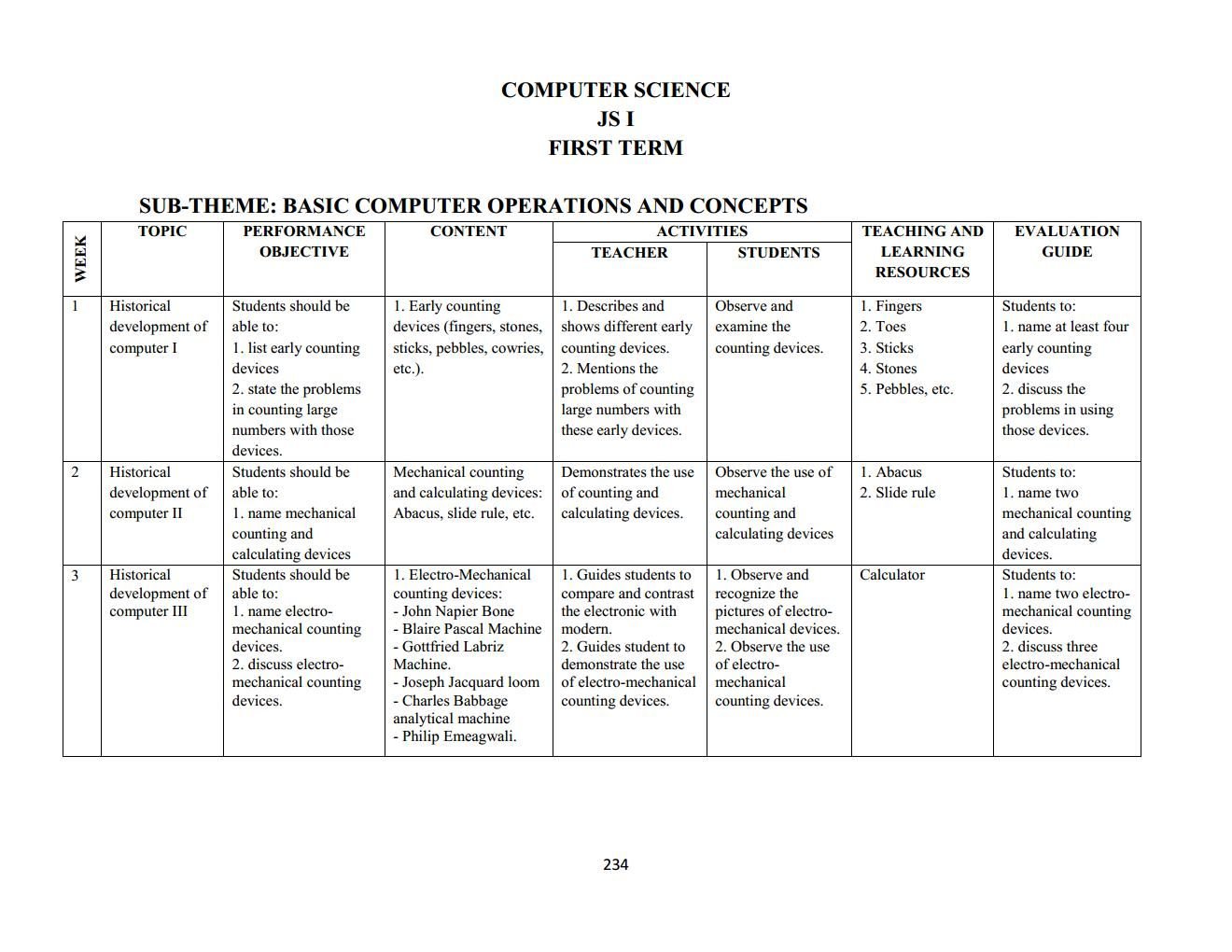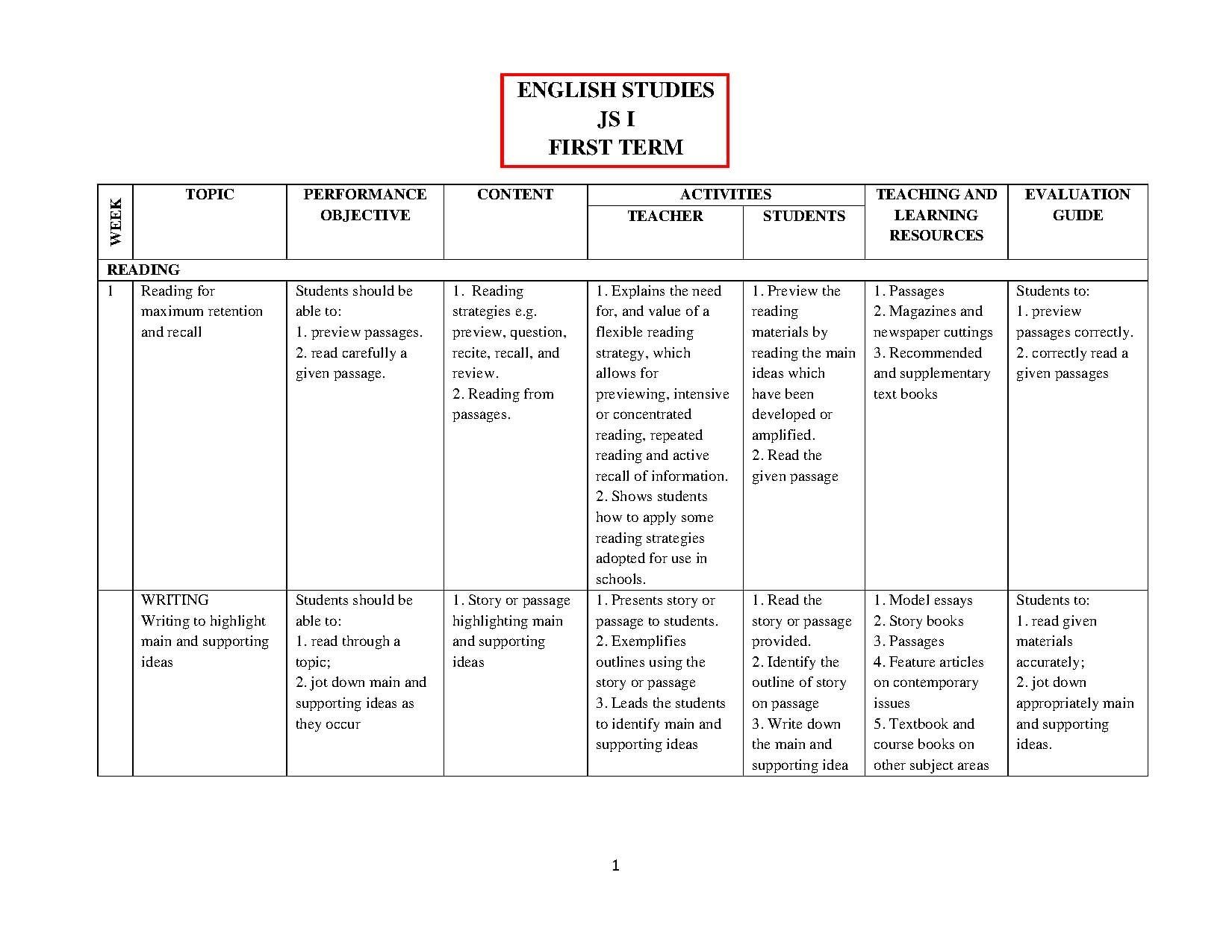Introducing the comprehensive Home Economics Scheme of Work for JSS1 Second Term! This curriculum has been meticulously crafted to provide a robust foundation in home economics for Junior Secondary School students. With age-appropriate and engaging content, this scheme empowers learners with essential life skills through a blend of theoretical knowledge and practical experiences.
Key Takeaways:
- Understanding family needs and goals
- Exploring waste disposal methods
- Learning about production of cleaning agents
- Discovering different types of cosmetics and deodorants, their uses, and safety
Home Economics Scheme of Work for JSS1 Second Term

Hello there, curious minds! Are you ready to dive into the exciting world of home economics? Whether you’re a seasoned JSS1 student or a parent looking to support your child’s learning, this scheme of work is your ultimate guide. Buckle up, and let’s explore the fascinating topics that await us this term!
Understanding Family Needs and Goals
Every family has its unique set of needs and aspirations. Understanding these is crucial for creating a harmonious and fulfilling home environment. In this unit, we’ll examine different types of needs and wants, as well as the steps families can take to achieve their goals. We’ll also touch upon important concepts like family values and effective communication.
Waste Disposal Methods
Waste disposal might not sound glamorous, but it’s an essential part of maintaining a healthy and sustainable environment. We’ll delve into different waste disposal methods, such as composting, recycling, and proper disposal techniques. Learn how to turn kitchen scraps into valuable compost, recycle paper and plastic responsibly, and dispose of hazardous waste safely.
Producing Cleaning Agents
Cleaning is an important part of keeping our homes safe and hygienic. In this unit, we’ll take a closer look at the principles of producing cleaning agents, such as soaps, detergents, and disinfectants. Discover the different ingredients used in these products and learn how to make your own effective and eco-friendly cleaning solutions.
Cosmetics and Deodorants
Cosmetics and deodorants are a part of our daily routines. We’ll explore the different types available, their uses, and safety considerations. Learn about the benefits and risks of using various ingredients, and make informed choices about the products you use. By the end of this unit, you’ll be a pro at choosing and using cosmetics and deodorants that suit your needs.
Conclusion
This scheme of work for home economics in JSS1 second term is designed to equip you with essential life skills and knowledge. Through engaging activities, hands-on experiments, and thought-provoking discussions, you’ll gain a solid foundation in home economics principles and their practical applications. So, get ready to unlock your inner home economics genius and make your home a haven of comfort, cleanliness, and well-being!
If you’re interested in the home economics courses offered in KNUST, be sure to visit this link to learn more. Check out this page for a complete home economics equipment list. Discover a variety of home economics topics, including home economics project topics. Explore our home economics research topics page to dive deeper into the subject. Lastly, the home economics scheme of work for JSS3 third term is presented for your reference.
Family Living: Budgeting and Home Management

Enter the world of family living, where financial planning and home upkeep intertwine to create a harmonious and comfortable environment. This blog section is dedicated to empowering you with essential knowledge and practical tips in budgeting and home management to enhance your family’s well-being.
Budgeting: A Blueprint for Financial Stability
- Plan and Prioritize: Establish a family budget that aligns with your income and expenses. Categorize expenses into needs, wants, and savings.
- Track and Monitor: Keep a record of income and expenses to identify areas for optimization. Use budgeting apps or spreadsheets for convenience.
- Set Financial Goals: Define specific financial milestones, such as saving for homeownership or children’s education. Break down large goals into smaller, manageable steps.
- Reduce Unnecessary Spending: Identify and eliminate non-essential expenses that drain your financial resources. Explore cost-saving alternatives and negotiate lower rates on bills.
- Build an Emergency Fund: Set aside a portion of your income for unexpected expenses or emergencies. This financial cushion provides peace of mind and prevents you from resorting to high-interest debt.
Home Management: Creating a Haven of Comfort
- Establish a Cleaning Routine: Determine a regular cleaning schedule to maintain a hygienic and organized home. Assign tasks to family members to foster responsibility and ownership.
- Declutter and Organize: Remove unnecessary items and find designated storage spaces for everything. A clutter-free home promotes a sense of calm and reduces stress.
- Maintain Appliances: Regular maintenance of home appliances ensures optimal performance and extends their lifespan. Refer to manufacturer’s instructions for specific cleaning and maintenance guidelines.
- DIY Repairs: Learn basic home repair skills to tackle simple repairs on your own, saving time and money. Access online tutorials or consult with experienced family members or friends.
- Create a Homely Atmosphere: Add personal touches to your home by customizing it with family photos, artwork, and comfortable furniture. Your home should be a reflection of your family’s style and values.
Key Takeaways:
- Budgeting is essential for managing household finances and achieving financial goals.
- Effective home management promotes a clean, organized, and comfortable living environment.
- DIY repairs can save money and empower you with basic home maintenance skills.
- Creating a homely atmosphere enhances family well-being and fosters a sense of belonging.
Relevant Sources:
- How to Create a Budget That Works
- 10 Home Management Tips for a Clean and Organized Home
Health Education: Hygiene and First Aid
Key Takeaways:
- Understanding Hygiene:
- Importance of personal hygiene practices
- Steps for maintaining good hygiene
- First Aid Basics:
- Principles of first aid
- Common first aid techniques
- Personal Health and Safety:
- Factors affecting personal health
- Safety measures for preventing accidents
Importance of Personal Hygiene
Maintaining good hygiene practices is essential for:
- Preventing the spread of infections and diseases
- Reducing the risk of skin irritations and other health issues
- Boosting confidence and overall well-being
Steps for Maintaining Good Hygiene:
- Wash your hands regularly with soap and water.
- Take a shower or bath daily.
- Brush your teeth twice a day.
- Wear clean clothes and socks.
- Keep your living space clean and tidy.
First Aid Basics
First aid is the immediate and temporary care given to a person who has suffered an injury or sudden illness:
- Principles of First Aid:
- Assess the situation and prioritize injuries
- Call for emergency help if necessary
- Provide basic first aid to stabilize the victim
- Common First Aid Techniques:
- Stopping bleeding
- Applying bandages
- Performing CPR
- Treating burns and wounds
Personal Health and Safety
Factors Affecting Personal Health:
- Nutrition and exercise
- Stress and mental health
- Lifestyle choices
Safety Measures for Preventing Accidents:
- Be aware of your surroundings
- Follow safety guidelines
- Use protective gear when necessary
Citations:
- WebMD: Personal Hygiene Tips
- Red Cross: First Aid Basics
Home Management: Laundry and Environmental Sanitation
Key Takeaways:
– Proper home management practices ensure a clean and hygienic living environment.
– Laundry involves maintaining clothing, linens, and fabrics for hygiene and comfort.
– Environmental sanitation promotes a healthy and sustainable living space.
– Waste disposal methods minimize environmental impact and promote community well-being.
– Safe and effective cleaning agents contribute to a hygienic and comfortable home.
Home Management: Laundry and Environmental Sanitation
Maintaining a clean and hygienic home is crucial for the well-being of families and communities. Home management, a core aspect of home economics, plays a vital role in ensuring a healthy and comfortable living environment. Proper home management practices include:
- Laundry:
- Proper laundry practices not only keep clothing clean and fresh but also prolong their lifespan.
-
Sorting clothes based on fabric type and color, using appropriate detergents and bleach, and adhering to washing and drying instructions are essential for effective laundry.
-
Environmental Sanitation:
- Environmental sanitation focuses on maintaining a clean and healthy living space by managing waste and promoting hygiene.
- Proper waste disposal methods, such as composting and recycling, reduce pollution and conserve resources.
-
Regular cleaning and disinfection of surfaces, proper ventilation, and pest control measures prevent the spread of germs and promote a healthy indoor environment.
-
Cleaning Agents:
- Safe and effective cleaning agents are essential for maintaining a hygienic home.
- Understanding the different types of cleaning agents, their appropriate uses, and safety precautions ensures effective cleaning without compromising health.
- Producing eco-friendly cleaning solutions using natural ingredients like vinegar and baking soda minimizes environmental impact.
Effective home management practices contribute to the well-being of individuals, families, and the community. By prioritizing Laundry and Environmental Sanitation, we create a clean, healthy, and sustainable living environment for ourselves and future generations.
Most Relevant URL Sources:
– Home Economics Scheme of Work For JSS1 Second Term
– Home Economics Scheme of Work For JSS1 Second Term
FAQ
Q1: What are the key topics covered in the Home Economics scheme of work for JSS1 Second Term?
A1: The scheme of work covers essential topics such as Family Needs and Goals, Waste Disposal Methods, Production of Cleaning Agents, and Cosmetics and Deodorants.
Q2: How does Home Economics contribute to family well-being?
A2: Home Economics empowers families to make informed decisions about their needs and goals, maintain a clean and hygienic home, and effectively manage resources for improved well-being.
Q3: What practical skills will students develop through the Home Economics scheme of work?
A3: Students will gain hands-on experience in producing cleaning agents, understanding waste disposal techniques, and exploring various types of cosmetics and deodorants.
Q4: Is Home Economics only relevant to girls?
A4: No, Home Economics is essential for both boys and girls as it equips them with skills that are crucial for managing a home and fostering a healthy family environment.
Q5: How is the scheme of work aligned with the Home Economics curriculum?
A5: The scheme of work aligns with the JSS1 Home Economics curriculum, ensuring a comprehensive coverage of key concepts and skills related to home management, food, nutrition, clothing, health, and resource management.
- Grass Forever in Livermore: Your Guide to Artificial Turf - April 22, 2025
- German Roaches vs. American Roaches: Key Differences and Control - April 22, 2025
- 150+ Flowers That Start With S: A Comprehensive Guide - April 22, 2025










